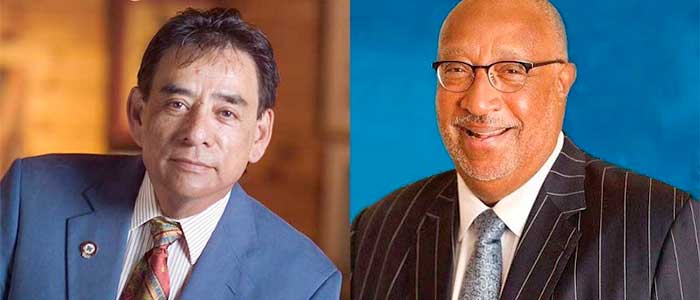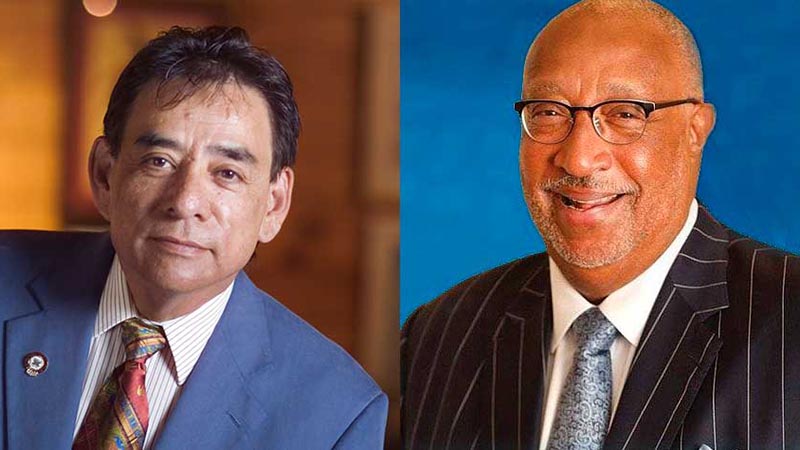
Learning from a news article that a longtime colleague died is tough. Learning that his death came just weeks after the passing of another colleague is even tougher. The higher-than-usual losses we’ve experienced during the pandemic have put in stark relief the sense of incalculable loss this disaster has instilled in all of us, especially with the loss of those who committed so much to the well-being of others and cannot be properly mourned.
The article, from Inside Higher Ed, reported on the passing of Irving McPhail, the recently installed president of Saint Augustine University in North Carolina. His death not only puts into stark relief the disproportionate impact that COVID-19 has had on African Americans, it also underscores the disease’s indiscriminate nature — what almost seems its perverse tendency to attack those who have committed so much to the well-being of others.
That giving nature, that commitment to serving others, also applied to David Gipp, former president of United Tribes Technical College (UTTC), who died last month after an extended illness.
I wasn’t close personal friends with Irv or David. But as professional colleagues, they were emblematic of the leaders I’ve long admired in higher education who are deeply committed to achieving racial justice and equity. Each man also reflected the service-minded values that I believe are as vital to the human workforce — one that underscores uniquely human traits and characteristics, such as empathy, ethics, collaboration, and creativity. Those traits and characteristics weren’t merely reflected in the professional lives of Dave and Irv, they were nurtured and fostered in the higher education institutions and organizations that they led.
Irv served as president of the National Action Council for Minorities in Engineering (NACME), and before that, as chancellor of the Community College of Baltimore County and president of Lemoyne-Owen College. He also held other notable leadership roles in higher education. I talked often with him about the pivotal role of higher education in transforming lives, and especially about the importance of extending the reach of high-quality STEM education to many more students of color.
NACME’s main role has been to provide scholarships to support students of color pursuing degrees at engineering schools — a key area of both job growth and significant underrepresentation, especially among African Americans, Hispanics, and Native Americans. NACME has been a leading STEM learning advocate at a time of rising need for STEM talent nationally — a task that Irv understood was central to achieving a fairer, more just workforce and society.
Trained as a journalist in the Army National Guard, Dave was the first full-time executive director of the American Indian Higher Education Consortium (AIHEC), an advocacy group I worked closely with for several years to help advance the development of federal policy and programs to support American Indian education. Nearly 40 tribally controlled colleges and universities have been established since the early 1970s by tribal governments or the federal government to provide higher education opportunities to Native Americans through programs that are locally and culturally based, holistic, and supportive.
Dave was a gentle and smart leader, and at the same time a fierce and uncompromising advocate for justice and equity. He saw American Indian education as the pathway to greater economic, social, and cultural well-being for individuals and tribal communities, and he was willing to fight for it.
As president of UTTC for nearly four decades, Dave built an accredited, successful institution fit for our times: one that offers two- and four-year college programs, along with career and technical education, and workforce training. And I watched him provide leadership not only for the school, but nationally as chair of the boards for both AIHEC and the American Indian College Fund, both vital in the national movement of self-determination and growth of indigenous communities and their people.
The loss of Irving McPhail and David Gipp is overwhelming for the families and friends they loved. St. Augustine University was robbed of a promising new leader. The Standing Rock Sioux Tribe lost an honored citizen and advocate.
More broadly, their passing is a reminder that compassion, empathy, ethics, collaboration, communication, and other human traits and capabilities are what give meaning and purpose to work and life. At this time of great challenge, we must honor their legacies by continuing to advance the service-driven ecosystem of human work our society so desperately needs.
Jamie Merisotis is president and CEO of Lumina Foundation and the author of “Human Work in the Age of Smart Machines.”
